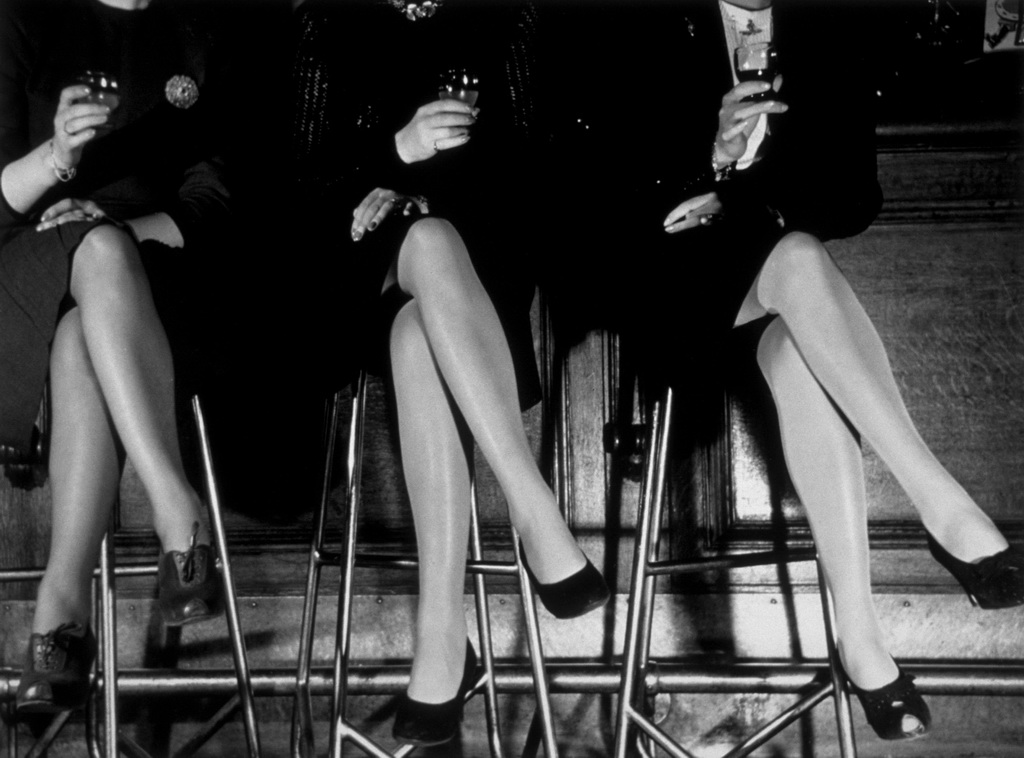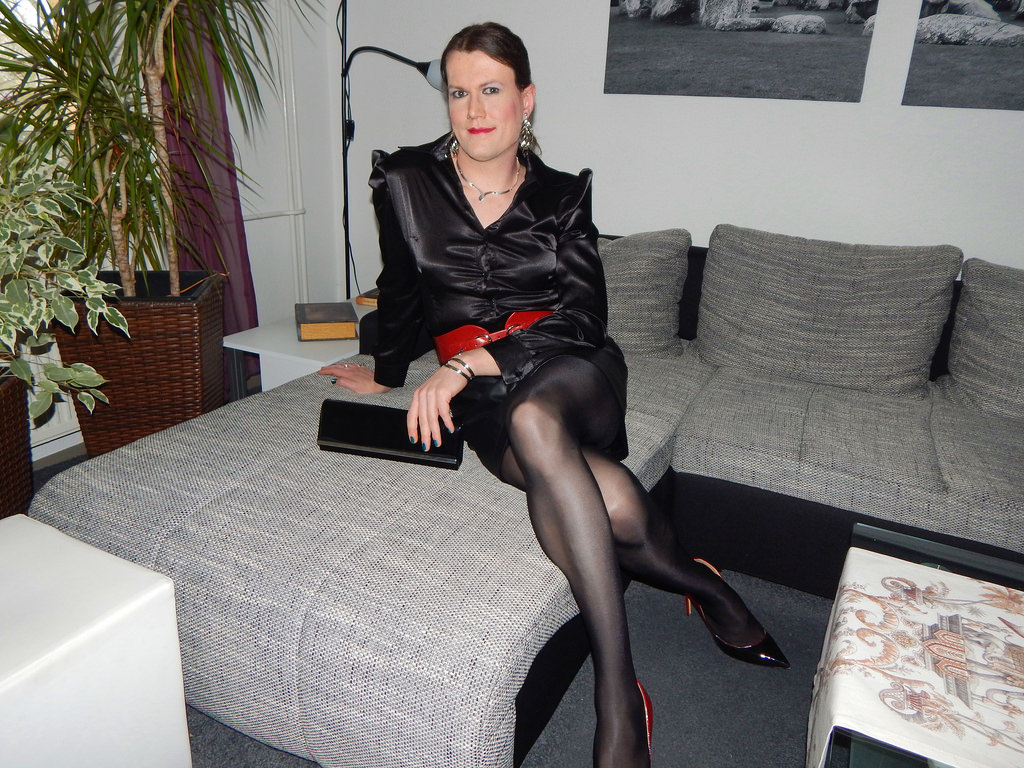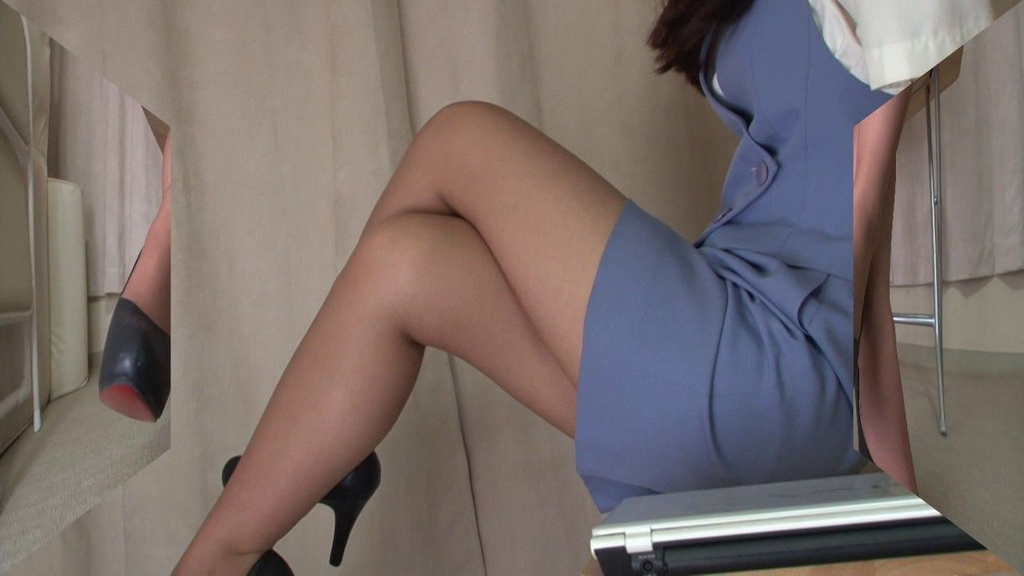
– This may not be the right forum for this sort of article but I would like to try it anyway. Last year there was a legal case in the UK which effectively made it illegal for employers to ban women from wearing trousers in the workplace on the grounds of sexual discrimination. The case involved a woman called Judy Owen and her former employer, the UK’s Professional Golf Association (PGA). There was also a similar case brought by a schoolgirl called Jo Hale, backed by her university professor mother, who used the threat of legal action to force her school to allow her to wear trousers with her school uniform. Needless to say, I wasn’t terribly impressed with the outcome of either case.
Furthermore, reading through the press coverage surrounding the two cases, I was surprised by the extent to which the Press unquestioningly accepted the feminist view that an outright trouser ban or an unwritten no trousers rule for women was both sexist and discriminatory. I fundamentally disagreed and wrote a letter to a national newspaper expressing my opinion, which surprise, surprise was never published. However, I would be interested to know what members of this forum think about the letter. Here is a slightly amended version of the original, expressing 10 reasons why I thought that the court got it wrong in the Judy Owen case and my general objections to the “trouser revolution”.
1. Smartness
This is the real nub of the trouser issue. For most jobs and office work in particular, the most important criteria is what mode of apparel looks the most smart? The pro-trouser lobby are always keen to point out that ladies look every bit as smart in trousers as they do in skirts. Sorry, but I don’t buy it.
Consider the following. In 1995 female barristers in England were officially granted the right to wear trousers in court, an event which is considered something of a landmark in the trousers versus skirts debate. At the time the following comment was reported in the Evening Standard. “I am not really in favour, because I think it could detract from the sobriety of the court. Trousers can be a bit casual, women look better in skirt suits”. Who can have uttered such remarks? A crusty old misogynist judge? No. A middle aged male chauvinist barrister? No again. Or how about an older female barrister who was something of a stickler for tradition? Still wrong. Believe it or not these words were actually spoken by a (then) 27 year old female barrister named Ciara Heavey, who clearly was not too impressed with her newly acquired liberty to wear trousers. I am indebted to Ms Heavey for expressing so clearly and succinctly what I have always believed and it was particularly gratifying to hear a woman expressing such sentiments.
Let’s face it ladies, she is right isn’t she? If most women were to be asked, “why do you wear trousers to work?” the words “variety” or “convenience” would figure quite prominently, but smartness would probably not feature that high up the list. When it really boils down to it, if you need to look as smart as possible, for an interview for example, I bet that the great majority of you would still probably opt for a skirt. Do you think that Judy Owen wore a pair of trousers to her interview with the PGA? I doubt it. Ms Heavey was correct, women do look better in skirt suits and as the office dress code should reflect whatever form of apparel looks the most smart, it does not seem unreasonable to me that ladies can be required to wear dresses or skirts to work.
2. Femininity
Women are not obliged to dress for the office in a manner that can be construed as sexy (indeed it can be argued that they have a duty not to dress in such a manner), but making the effort to look feminine is an entirely different matter. I am sure that many women would argue with my contention that skirts are smarter than trousers, but I suspect that fewer ladies would disagree that skirts are more feminine and attractive. I am also sure that much of the impetus behind the pro-trouser movement stems from the misplaced notion that femininity is to be despised in the workplace and that in order to be able to compete with men you have to dress like them. Given that some of the most successful and formidable ladies that I have encountered during my career have been women who seldom, if ever, wear trousers this theory is patently errant nonsense. After all the most outstanding British female role model for success, Margaret Thatcher, apparently only ever wore trousers once whilst she was in office and she was certainly never perceived as a pushover by any man. In view of the above, is there anything wrong with a dress code that encourages a more feminine style of dress?
3. Empowerment
Many members of the pro-trouser lobby argue that a trouser ban is outdated and anachronistic. Perhaps they are correct. However, surely their own arguments are similarly outdated. Despite 30 odd years of women’s lib it seems bizarre that the question “who wears the trousers” still has such resonance. Why is that “wearing trousers” is still seen by many women as a symbol of empowerment? On the contrary I am sure that many women who have not fallen for the allure of trousers would say that dressing in a way that is professional, yet feminine, is empowering because it engenders an attitude of greater respect from their male colleagues. Furthermore. I suspect that many women who wear stockings would say that this gives them greater self-confidence in the office, which is also a form of empowerment. Indeed research conducted in the 19’70s indicated that women who always dressed for work in dark skirted suits generally enjoyed higher levels of success and although times may have since changed, this at least partially confirms my theory.
4. Practicality
Women often argue about the fact that trousers are more “practical” than skirts. This assertion generally seems to revolve around the fact that a lady may suffer what might politely be termed “a momentary loss of modesty” when dressed in skirt. I have never worn a skirt myself, so it is difficult for me to comment on the pitfalls of actually wearing one, but I am prepared to have a stab at putting up a plausible counter argument. I do concede that there are professions or circumstances for which skirts are inappropriate. For example, I have been saddened to note that whereas all British Policewomen used to wear skirts, they now almost all wear trousers, but I recognise that the nature of the job dictates that trousers are obviously a more suitable form of dress. And although I personally hate the thought of it, I can see that nurses also have a strong case for being allowed to wear trousers. But female office workers are generally not required to partake of activities such as climbing ladders where a skirt can be both a hindrance and a liability. Given the above, I do not believe that practical considerations constitute a valid reason for rendering an office trouser ban unreasonable
5. Comfort
I also frequently hear women remark that “skirts are too cold in winter”. I can appreciate that wearing a skirt leaves a lady’s legs and thighs rather more vulnerable to winter cold, but given the availability of warm hosiery, boots and long overcoats I suspect that these drawbacks are very often overstated. Besides, the nature of office work does not normally require excessive exposure to the elements and even in this day and age, many women wear skirts to work every day right throughout the winter and I am not aware of any of them dying of hypothermia as a consequence! I am also inclined to say “so what”, as we men are obliged to put up with the inconvenience of wearing a collar and tie on stifling hot summer days.
6. Discrimination
Judy Owen argued successfully that a trouser ban amounted to sexual discrimination, but I struggle to follow the logic that obliging a female office worker to wear a skirt to work amounts to discrimination. In order to be discriminated against, surely one has to prove that one has been disadvantaged. But how is a lady working in an office actually disadvantaged by wearing a skirt as compared to a male colleague in trousers? And which sex is actually more commonly discriminated against when it comes to the office dress code? Men generally have a far more restrictive dress code than women, most of us being obliged to wear suits, collars and ties. In comparison, a requirement that ladies wear dresses or skirts does not seem like discrimination to me.
7. The woman’s “right” to choose.
You often hear ladies who are in favour of trousers say “women should have the right to choose whether or not they wear trousers”. But men generally have no corresponding right to choose whether or not they wear suits, collars and ties, so why should ladies be given the option not to wear skirts? I am of the opinion that an employer should be free to determine a dress code that they believe presents the best possible image for their business. It is not up to an employee such as Ms Owen to determine what dress code is suitable for her employer’s business. If the employer decides that this means suits, collars and ties for the men and jackets and skirts or dresses for the women then this seems perfectly reasonable to me.
8. If it ain’t broke, don’t fix it
I am not going to try and argue against the fact that most women believe that they should have the option of wearing trousers. However, during the Judy Owen industrial tribunal, a number of female employees of the PGA turned up at the proceedings to demonstrate that they actually supported their employer’s trouser ban. Likewise in the Jo Hale case, Jo’s mother was the lone parent amongst hundreds who actually wanted to allow the girls to wear trousers, which is a strange kind of democracy by any standards. Surely the fact that the majority of the PGA’s female staff and parents at Jo Hale’s school were opposed to a change in the existing dress code counted for something? Why should a disgruntled former employee or lone parent dictate to her former colleagues or fellow parents what dress code is appropriate? As a result of this case, there will now doubtless be revisions to “no trousers” policies in companies and schools throughout the land, despite the fact that in many cases there is no majority opposition to a “skirts only” rule. This is surely wrong.
9. She knew what she was getting into
Surely Judy Owen knew of the PGA’s “no trouser” policy at the time when she accepted the job. At the very least she would almost certainly have signed a contract that obliged her to conform to whatever dress code the PGA deemed appropriate. As such, what gave her the right to subsequently breach her contract and then take her employer to an industrial tribunal over this issue? After all, if Ms Owen did not like the PGA’s dress code she was perfectly entitled to go and work for another company that did allow her to wear trousers.
10. Political Correctness
As with so many areas of modern life, the whole issue of skirts and trouser bans in the workplace has become poisoned by Political Correctness. Many feminists, seem to think that wearing skirts is synonymous with centuries of male oppression of women and inevitably seek to brand as “sexist” any person like me who believes that women should not wear trousers to work. In turn this tag “sexist” discourages people from putting a reasoned case against women wearing trousers. But I do not accept that I am a sexist. I define a sexist as someone who considers women to be inferior. Well how does the fact that I prefer to see a workplace dress code that celebrates the fact that man and women are different and should not be dressed alike in utilitarian trouser suits, mean that I consider women to be inferior? In reality I believe very strongly in sexual equality in the home and the workplace, it is just that I do not see a “trouser ban” as being a manifestation of inequality. And where does this sexism charge leave “post-feminist” women such as Ms Heavey who also believe that ladies should not wear trousers? Presumably she is a traitor to the sisterhood who should be publicly hanged with her own stockings as an example to others! The decision of the Judy Owen case reeked of political correctness, as it seemed to ignore many flaws in her case and came up with a verdict that followed the politically correct dogma of the day but was judgementally flawed.
Congratulations to anyone who has managed to read all the way through my rant against political correctness! Sorry if I have bored you, but if not I would be delighted to hear from you.
– While I definitely prefer women in skirts, I have to respect their right to choose what they want to wear. The very fact that this bulletin board has a section for sightings in which I’ve read numerous posts where the individual would follow the woman, indicates that men find women in skirts somewhat sexually arousing. Many women (my wife, for example) would prefer not to have this type of attention.
There have been many times when my wife would walk down the street in a skirt suit and she would get cat calls from rude men (and her outfit was not that revealing). If the woman feels comfortable wearing a skirt, then fine, that is her choice. What about women who have varicose veins or unsightly legs? Why should they be forced to wear something that makes them feel self-conscious? A collared tie and shirt would not make a man self-conscious, so in my opinion, that argument does not hold water.
Don’t get me wrong. I truly believe that all women should wear skirts and stockings. But only if they want to and are comfortable with it. A big part of the sexiness is the confident attitude that comes along with wearing a skirt and stockings. But to have the confidence, they have to be mentally comfortable. The bottom line is that while pant suits do not look as feminine or attractive as a skirt suit, it can still present a professional image. Having a mandatory code is wrong and frankly it violates our right of self expression. I know my viewpoint may not be a popular one, but it is my opinion and I would welcome anyone for feedback.
– The short answer is that woman look more feminine in skirts and dresses; more masculine in trousers. It is what comes out of their brain or mouth that ultimately puts them on a level playing field not what they are wearing.
– I agree with almost all of the original post. May I confirm a few things?
Firstly, no female barrister who wishes to get anywhere in the profession would ever wear trousers for an interview or Court appearances. Most Judges and other barristers regard the retrograde step of allowing female barristers to wear trousers with contempt and I for one am hardly able to take seriously any woman who so devalues her own femininity by so dressing.
Secondly, I agree entirely: the PGA case, the schoolgirl case, and another involving Eurostar employees: all of these females entered the employment/school in full knowledge of the required dress code. It must be the right of an employer or school to insist on a dress code, usually for very good reasons, and anyone voluntarily starting to work for such an organisation should not, AFTER THEY HAVE STARTED, have the ability to challenge that dress code. The remedy is simple: go elsewhere.
Lastly, I agree that those ladies (and I use that term in its proper sense) who I have known to wear stockings have abounded in confidence, femininity and charm that has done them more good in life than all of the wrong-headed feminists have ever done for womankind. Those who are real ladies know just what power they have over mere men and they hardly need to resort to feminist claptrap or idiotic inappropriate forms of dress (trousers) to achieve what they want in life!
– Well, interesting debate but unfortunately, I disagree. While your letter was extremely well written, thought-provoking and certainly concise, it’s basis is still on opinion, anecdotal evidence and tradition.
True, I’m not a barrister, in the legal profession or even in England but the issue comes down to a person’s right to choose. I support that. While allowing a woman the option of wearing trousers as a barrister, it does not state they MUST wear trousers. They are still free to choose the formal, traditional, feminine and (obviously) much more welcomed and appreciated, skirt suits.
While Ms. Owen was aware of the “no trousers” rule, is it fair and reasonable? Does wearing trousers negate her job skills and effectiveness? Is the rule outdated?
Many of life/career/lifestyle’s unwritten rules are based on tradition, repetition, societal mores or archaic justifications. Times and life has changed. Amazingly enough, you don’t need rules to support them. I have found that just being able to do something does not immediately make the general populace take up something that is still supported by tradition.
Of course, I also hold to the theory that being able to have a choice increases options for everyone. For instance, on this forum we would support more stocking wearing. Well, if the options were increased, wouldn’t that, in essence, give more freedom to try those other options? Wouldn’t that lead to more experimentation and perhaps sway more stocking wearing? No one is removing the skirt and (women please forgive me) not every person has attractive legs and wearing a skirt definitely shows the legs.
There were a few cases here in the US about 5-6 years ago where some men wanted the option of wearing skirts (ok, kilts) but were denied. There was also a case involving a company where the men requested to wear shorts during the summer months and were refused so they opted for skirts (I think the US Postal Service had some sort of case also). They did not violate the “dress code” but the company retaliated. They eventually overcame. There were also a number of US high schools where boys wanted to wear shorts and were denied, so they bought and wore the school uniform skirts and were expelled. They were subsequently reinstated and won the right to wear shorts or skirts.
My long point is unless the job specifically requires a uniform (for both sexes) than most dress codes beyond “guidelines” (ie pressed white shirt/blouse, blue trousers/shorts/skirts, dark lace-up shoes) are unfair and outdated.
Women (on this forum) who wear stockings sometimes are looked upon with disdain from other women and men as “tarty” and we would like that to be stopped; shouldn’t we also support the freedom to wear something else then?
There comes a time when enough is enough and who cares if the woman is wearing trousers, stockings, etc or if a guy is wearing shorts, a skirt or pantyhose. Are they decent, law-abiding people who are doing their job and aiding society?
– The posts above reflect significant depth in thought. This is a honest debate and I enjoyed each perspective posted on this issue.
As a “Liberitarian”, I firmly hold to the individual’s right of choice – even when that choice conflicts with my choice.
– From the female viewpoint, the question is not so much the trouser issue but that of political correctness going mad. I deplore whistling or catcalling by ignorant buffoons, but I don’t mind an admiring look. I wear trousers when the situation or the weather requires it and hopefully I retain the right amount of femininity. Trousers that are nicely styled can be quite appealing, especially with heels and a bit of ankle showing.
In the 1950s, the Communist world (the Soviet Union and its loyal satellites) encouraged and enforced the eradication of middle class values, that manifested themselves amongst other things, in well dressed women, stockings, jewellery and the like. A woman’s place was in the factory contributing to the five year plan. The appropriate clothes were shapeless overalls. Lipstick and nail varnish automatically portrayed loose morals and non conforming to Marxist Leninist values.
The designation of Mr, Miss, Mrs was tantamount to a crime. In the egalitarian society everyone was addressed as “Comrade”.
The political correct values that are forced upon us, assist only the non achievers of society and those who have a vested interest in destroying society as we know it (or more correctly, knew it).
– Amazing threads on this post. All the viewpoints here tend to mirror my own conflicts with the issue.
I agree that one is always better off wearing a skirt suit over a pant suit in the professional arena. Here in Boston, trousers for women in law and banking have only been given a very recent nod.
What I mind is that in doing so, it has given people license (this pertains to both genders) to throw style and taste out the window, and wear whatever they choose to wear, whether or not it looks right on them.
And I agree that law suits brought by an employee to protest the dress code *after* they have been hired is absurd. If you knew about it, and didn’t like it, you should not have accepted the position. The problem is these people exist for no other reason than to stir stuff up. They have some misguided notion that those in the company are somehow being abused, akin to being locked in a sweatshop all day and beaten if they don’t produce quota. In their minds, we are all ignorant of our ‘rights’ and they are going to enlighten us.
And in following the post regarding Soviet-era dress code, Political Correctness has done the same here in the US. It almost seems that a woman who chooses to dress nicely (not expensively, just properly) is looked upon as a threat to the “sisterhood”. Somehow, if we choose to dress in a proper and put-together manner, we are giving in to using our sexuality to further us.
There is a bit of a debate going in some circles regarding the paradox of feminist teaching. As women, we are taught that we are strong, capable and independent. Able to make our own decisions and live with the consequences. However, one notices that this only works when it doesn’t involve the stickiness of human relationships. Then, when something goes wrong, the woman suddenly becomes shown as a martyr for Victimhood. She was seduced! She was coerced!
Which are we supposed to be? Here you see the quandary we’re in. Are we weak, helpless creatures, preyed upon by others, or strong and independent, able to pick up the pieces and move on?
I didn’t mean to get off on my soapbox, but I thought it was an interesting thing to bring up.
– An interesting mix of responses so far. It is particularly nice to read the ladies comments on political correctness gone mad and the quandary of the inherit contradictions of feminism.
I stick to my viewpoint that female animosity towards a “skirts only” dress policy has more to do with years of feminist bile and propaganda than genuine instances of sexual harassment. And as I said before, men don’t generally have any choice as to what they wear to work, so in this world of sexual equality, why should it be different for women? As for unsightly legs, well no-one is proposing to outlaw long skirts!
The comment about women seeking to change a dress code after they have entered an organisation is very apposite, particularly in the Jo Hale schoolgirl case. Other parents at the school were generally very hostile to Hale’s legal action, noting that Jo’s mother, professor Clare Hale, had initially chosen to send Jo to this particular school in preference to schools closer to her home, largely because it had a stricter dress code and better discipline. As I said before, this is a very strange form of democracy.
I am quite intrigued by the remark that “most judges and other barristers regard the retrograde step of allowing female barristers to wear trousers with contempt”. Is this generally the view amongst female barristers themselves? I actually kept a couple of newspaper articles relating to the Lord Chancellor’s 1995 decision to officially lift the female trouser ban and noted that with the exception of Ciara Heavey, all the female barristers quoted in the articles seemed fairly enthusiastic about the change. Comments ranged from a registered trouser militant named Ann Gibberd ranting that “wearing trousers makes sense…skirts are not the most suitable thing” to a lady named Georgina Kent who remarked “I’m a skirts person myself, but ladies should be allowed to wear what they want providing they look smart”. Hence you would have thought that six years on the courts would be full of trouser clad female barristers, but seemingly not from what you say. In your experience, what is the percentage of female barristers who never wear trousers in court and is this percentage lower amongst younger barristers? And do many female barristers wear trousers when working but not appearing in court?
I also agree with the remark that the end of the trouser ban has been the prelude to a general decline in female dress standards. It would not be so bad if there was a stipulation that trousers should only be worn as part of a suit, but seemingly the Judy Owen case has left UK employers too terrified to enforce any female dress code whatsoever. The upshot is that in my organisation I am quite frankly astounded at what some women get away with wearing to work and think it is high time that some standards were reintroduced, even if the good old skirts-only policy is sadly out of the question.
– Despite its length I read fully through this post because I thought it was important. Some thoughts:
- It’s ironic that women have to feel empowered by denying female dress. It’s paradoxical that women would seek to dress like males in order to feel equal to them. Aren’t they rather mimicking males, and is that not a contradiction?
- Although I prefer women in skirts and dresses I hold no great opposition to them in trousers. I think women look great in a stylish pantsuit, heels and hose. I don’t mind them in jeans so long as they maintain an overall feminine look. My objection comes when women feel they “have” to dress this way and play down their femininity.
- I agree, some of the strongest, most steel-willed and indeed self-confident women I have come across dressed in the most feminine way. It is interesting to note these women also eschewed popular “feminism” for their own sense of female or individual power. They realised they didn’t have to “give up” femininity to be any man’s equal – I think that’s an important point.
- I am not that rigid that I think pants should be banned on women in the workplace, so long as the apparel is well-tailored and otherwise professional. Nevertheless I see no reason why women bring legal challenges against a ban on clothing like skirts, particularly on grounds it debases them as women. They’re merely buying into the popular feminist cant of the day. And, because I believe in equality I also believe dress codes should be applicable to men; if women must wear skirts or dresses men should wear suits and ties.
- Despite the incredible “dumbing down” of dress codes in workplaces in recent years there are a number of employers who insist employees “dress up” for the job. A recent article I read demanded this from employees in a call centre, where they never meet the public but work in cubicles on the telephone all day. Why? Because professional dress instils professional attitudes and self-confidence and ultimately a better job.
- The demand by female employees that they be allowed to wear pants, or even much more casual forms of clothing and “unfeminine” shoes and sandals, simply is buying into a current ethos. There is nothing inherently better from a sexual equality standpoint in wearing these clothes.
- The fact that women have to dress like men so they will avoid sexist catcalls and other offensive behaviour is indicative of a retreat on the part of women. Instead of getting men to change their behaviour – which is what should be done and what feminists “say” they want men to do – they capitulate by dressing less feminine, rather than embracing their femininity and “standing-up” to men by wearing it in its fully glory.



